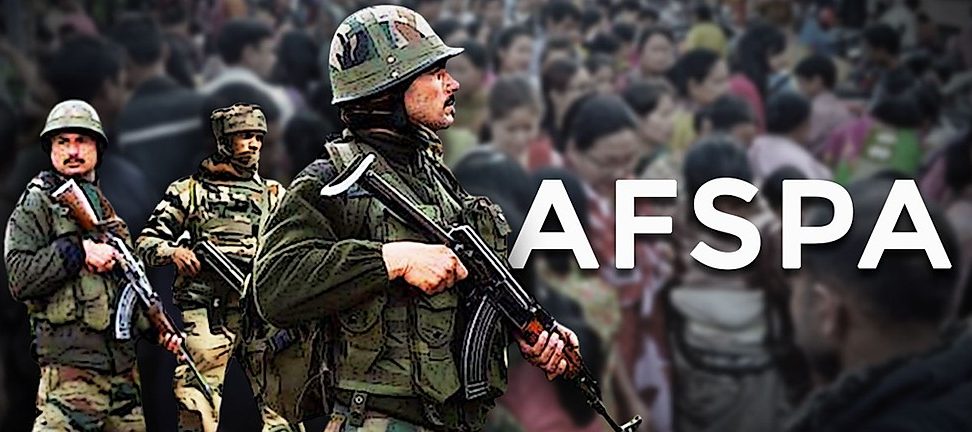Context:
Recently, the Union Home Ministry has extended the Armed Forces (Special Powers) Act (AFSPA) for another six months in specific areas of Nagaland and Arunachal Pradesh.
More on the News
- The areas affected by this Act remain the same as those specified in the last notification issued in March.
- In Nagaland, AFSPA will be extended for six months, from October 1, in eight districts and 21 police stations in five other districts.
- In Arunachal Pradesh, AFSPA was extended in Tirap, Changlang, and Longding districts, and specific areas falling within the jurisdiction of Namsai district of the State along the Assam border.
What is AFSPA?
- The Armed Forces (Special Powers) Act, of 1958, is a controversial act that grants special powers to the Indian Armed Forces in “disturbed areas”.
- Section 3 of the AFSPA,1958 empowers the Governor of any State or the Central govt. to issue an official notification declaring the state or region within as a “disturbed area”.
- AFSPA grants extensive powers to armed forces and Central Armed Police Forces (CAPFs) in designated “disturbed areas” to take actions such as killing, arresting, and searching without warrants, and provides immunity from prosecution without the Central government’s sanction.
AFSPA Applicable areas –
- Assam: 4 districts viz. Tinsukia, Dibrugarh, Charaideo and Sivasagar
- Nagaland: 8 districts and in the areas of 21 police stations in 5 other districts
- Arunachal Pradesh: 3 districts (Tirap, Changlang and Longding) and a few areas in the Namsai district along the Assam border
- Manipur: In the whole State except in the jurisdiction of 19 police stations in seven districts of the Imphal Valley
- In recent years, AFSPA was removed from Tripura (2015) and Meghalaya (2018), and it is not in force in Mizoram as well.
- Jammu and Kashmir: In the whole of the State under a separate statute, the Armed Forces (Jammu and Kashmir) Special Powers Act, 1990.
Criticisms of AFSPA
- Human Rights Violations: Concerns about potential misuse of power leading to civilian casualties, arbitrary arrests, and extrajudicial killings.
- Alienation of Local Population: The feeling of being under military rule can create resentment and hinder efforts to build trust with the local population.
- Impact on Democracy: Raises concerns about the erosion of civil liberties in the affected areas.
Arguments in support of AFSPA
- Maintaining Order: Supporters argue it’s a necessary tool for the security forces to effectively combat insurgency and maintain public order in disturbed areas.
- National Security: Seen as essential for protecting national security and territorial integrity.
Way Forward
- Implementing the recommendations of the Justice Jeevan Reddy Committee, which suggested that AFSPA should be repealed and appropriate provisions should be inserted in the Unlawful Activities (Prevention) Act, 1967 to deal with terrorism.
- Adhere to the guidelines provided by the Supreme Court in the Naga People’s Movement for Human Rights vs Union of India case, which stipulates that the use of deadly force under Section 4(a) of AFSPA should be employed only under “certain circumstances”.

